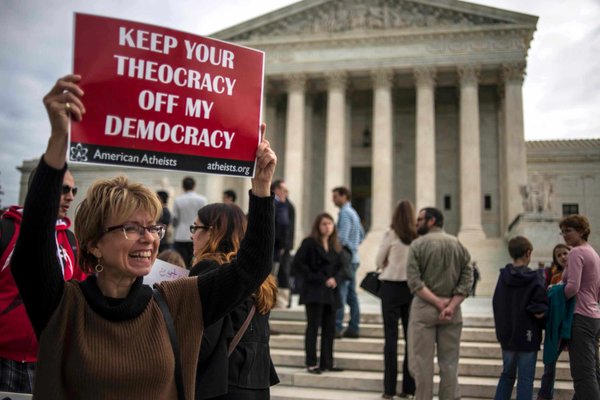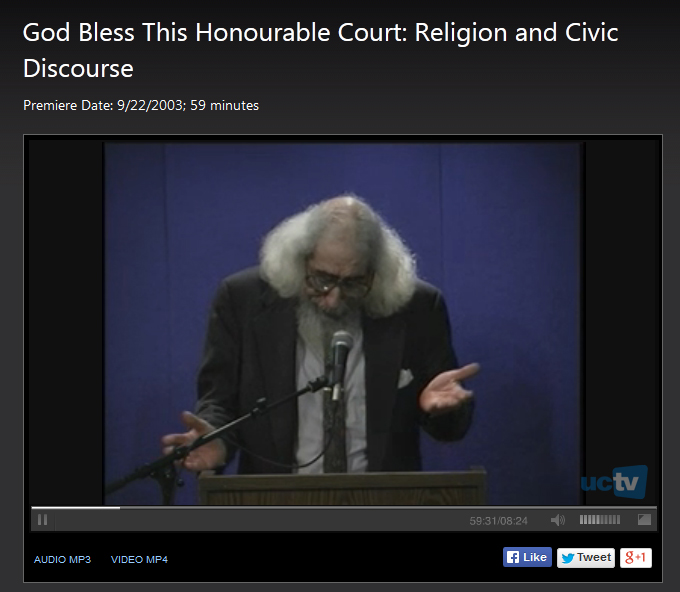 Perhaps you’ve caught the news about a recent Supreme court decision in the U.S. in which (by a slim, but sufficient, 5-4 majority) local town meetings that begin with prayer were held to be constitutional — so long as religions were not actively excluded from the opportunity. The majority (read the decision, and various commentaries, for yourself here, linked under “Opinion”) concluded:
Perhaps you’ve caught the news about a recent Supreme court decision in the U.S. in which (by a slim, but sufficient, 5-4 majority) local town meetings that begin with prayer were held to be constitutional — so long as religions were not actively excluded from the opportunity. The majority (read the decision, and various commentaries, for yourself here, linked under “Opinion”) concluded:
All that the Court does today is to allow a town to follow a practice that we have previously held is permissible for Congress and state legislatures.
While there’s too much in this one decision to address in a brief blog post like this (such as whether the First Amendment —
 — ought to be read as saying that all religions in the local neighborhood simply need to be represented equitably in state functions or whether there’s a so-called [possibly rather porous] wall of separation between religion and the state), I’m simply interested in the response that has met the Court’s decision. For it seems to me that we have here a very nice illustration of how the discourse on religion works.
— ought to be read as saying that all religions in the local neighborhood simply need to be represented equitably in state functions or whether there’s a so-called [possibly rather porous] wall of separation between religion and the state), I’m simply interested in the response that has met the Court’s decision. For it seems to me that we have here a very nice illustration of how the discourse on religion works.
First off: by “the discourse on religion” I merely mean a thoroughly modern way of talking, acting, and organizing that presumes that some domains of what I’ll simply call the human are uniquely distinct from all others — whether to then praise, nurture, or reproduce what falls within that special domain or criticize, demean, or undermine it. For regardless on which side of the never ending tennis match that you’re playing (i.e., “Religion is good!” v. “Religion is bad” or “Religion needs to be experienced for yourself!” v. “Religion needs to be reduced and explained away!”), a common set of presumptions underlies the debate: that a series of otherwise discrete things in the world (e.g., what some people say before they eat, what other people do with the dead bodies of their kin, and what yet other people think about the origins or end point of the universe, and so on, and so on…) are essentially and obviously united by sharing some key trait that, I guess, makes them all “religious,” in contradistinction from all that is non-religious.
What’s more, it has long struck me that this set of assumptions was key in reproducing a certain style of living, a specific manner of identify formation, that we’ve come to call modernity, in which the distinction between private and public plays such a prominent role. For it is a handy organizational technique whereby aspects or features of the otherwise ambiguous domain of human activity are neatly sorted and ranked — the only question remains whether the things placed into this basket are allowed in that quadrant; and that’s where we come back to the Town of Greece v. Galloway decision. For both sides know that religion exists, that it is real, that it has affect and effect — they’re just debating where it ought to have those a/effects.
And voila, the discourse on religion is alive and well regardless which way that one Justice’s swing vote goes.
So let me ask the misleadingly simple question, to try to shake things up a bit:
WWDS: What Would Durkheim Say?
That is, if we break away from the largely unquestioned preconditions of the current debate, cease to presume that certain things in the world just are religious (leading us, then, to debate with each other where we ought to place them and what can or can’t get too near to them), we might, instead, turn our attention to the social work being accomplished by the classification itself. For in my reading, Durkheim wasn’t interested in finding the right definition of sacred or determining the correct relationship between sacred and profane things but, rather, was keen to study what dividing the world up in this way accomplished for people.
So what would Durkheim say about Town of Greece v. Galloway?
Or, to rephrase, what would a scholar who is not interested in arranging the world in the right way (whatever that may be) but, instead, keen to study how and why it happens to work right now, in this or that way, for these people, say about both the case of offering a prayer before a government meeting as well as the various reactions — on the left and the right — to the way the court decided it this time?
If you’ve got 59 minutes to spare, then you can start making the switch by watching this (click the graphic)….

